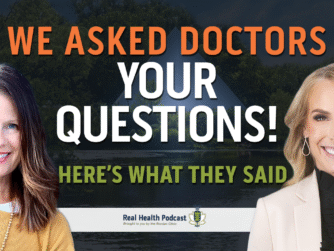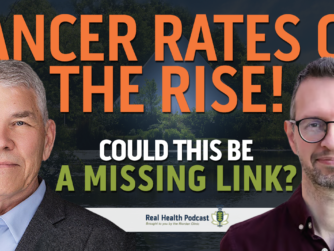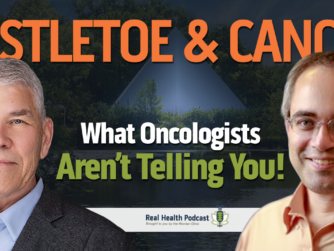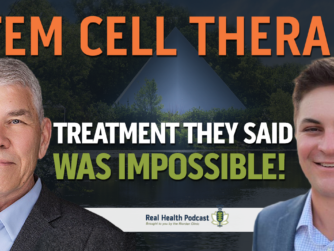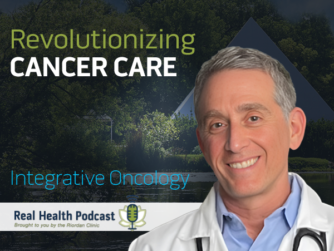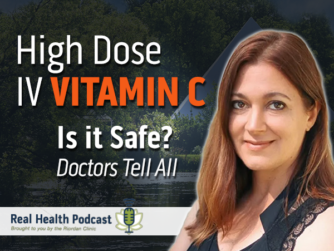In this episode, Dr. Ron continues his conversation with Dr. Tereza Hubkova about the microbiome and how your gut is your “2nd brain”.
Thank You To This Episode’s Sponsor
Episode Links and Promotions
Facebook: @AdventHealthWholeHealthInstitute
www.WholeHealthInstituteKC.com
Episode Transcript
Disclaimer: The information contained on The Real Health podcast and the resources mentioned are for educational purposes only. They are not intended as and shall not be understood or construed as medical or health advice. The information contained on this podcast is not a substitute for medical or health advice from a professional who is aware of the facts and circumstances of your individual situation. Information provided by hosts and guests on The Real Health podcast or the use of any products or services mentioned does not create a practitioner patient relationship between you and any person’s affiliated with this podcast.
Intro: This is The Real Health podcast brought to you by Riordan Clinic. Our mission is to bring you the latest information and top experts in functional and integrative medicine to help you make informed decisions on your path to real health.
Dr. Ron Hunninghake: Well, hello again, everyone. This is Dr. Ron Hunninghake. I’m here at the Riordan Clinic, and this is our Real Health Podcast. And I am so pleased that we can welcome back Dr. Tereza Hubkova, who is the integrative doctor at, what is it, AdventHealth in Kansas City. And we’ve gotten to know each other and I’ve found out how Dr. Hubkova knows a lot about the microbiome. And for those of you that listened in to part one, we kind of ended on kind of a negative tone because we were talking about all the ways that modern life has messed up our microbiomes. And fortunately, Dr. Hubkova is back with us again to kind of help us bring this full circle and help us to understand what it will take for us to have a robust, healthy microbiome. So, Dr. Hubkova, thank you so much for coming back again and welcome.
Dr. Tereza Hubkova: Thank you so much for having me back.
Dr. Ron Hunninghake: There’s that famous saying, “Death begins in the colon.” At least, all naturalistic practitioners know about that. Where does that come from and who said that and how is that going to help us figure out what to do to make our microbiomes robust and healthy again?
Dr. Tereza Hubkova: Yeah, so that’s kind of a famous quote from Russian scientist, Elie Metchnikoff, who discovered, I want to say it was last century when he was curious how come the people in Bulgaria often lived to be over a hundred years of age. And he really paid attention to their diet, and he noticed that they often drink fermented milk, kefir. And he really attributed the longevity to the kefir. And sure enough, the kefir ends up having lactobacillus bulgaricus, one of the beneficial probiotics. So that’s how the whole interest in probiotics began and interest in making yogurts and other fermented foods.
Dr. Ron Hunninghake: Yeah. If you go into any health food store now, there are very robust sections with all kinds of different fermented drinks, fermented vegetables, fermented dairy and whatnot. And also, all kinds of probiotics, prebiotics, and now there’s even post biotics. So this opens up a whole can of biotics that we can talk about. Are all these things the type of stuff we need to do in order to repair our gut? The average listener’s asking right now, “What’s something simple that I can do to kind of help me have a healthier gut?”
Dr. Tereza Hubkova: Yeah. Yeah. I think you always want to start with healthy diets. That’s the key. And you want to have diversity of different fruits and vegetables and colors and nuts and seeds and mushrooms because the more diverse is your diet, the more different types of fiber there are in your diet. That is what the microbes like. So you feed different kinds of microbes and then you have more diverse microbiome, and diversity is always good. It’s the same in Amazon forest. If you lose diversity, diseases will start happening. It’s the same in our gut microbiome. Each microbe has a different job. You want all the jobs to be done, so you want diversity. So start with a really, really healthy, diverse diet. Don’t get stuck in a routine where you have the same breakfast, where you eat the same lunch and same dinner.
Dr. Tereza Hubkova: There are a lot of people who just eat five items all the time, and then I’m sure that their gut microbiome is not very healthy. So start with the food. But as you pointed out, there are a lot of fantastic fermented products now available that have probiotics in them, whether it’s a yogurt or kefir, kimchi, fermented vegetables, which I love. Those are my favorite. Sauerkraut, meso, which is fermented soy. So you can have different fermented foods, and they don’t just have the beneficial bacteria. They also have the food that the bacteria like to eat. So they are basically prebiotics as well. Prebiotics are what the probiotics like to eat.
Dr. Ron Hunninghake: And my Irish and German heritage friends would be disappointed if we didn’t mention beer and wine, if used… These are fermented products. You have to use them in the proper dosing though. You don’t want to overdose, but it can be very beneficial that way too.
Dr. Tereza Hubkova: Yeah. Yeah. Even coffee is a prebiotic. That’s my beverage of choice.
Dr. Ron Hunninghake: Oh, great.
Dr. Tereza Hubkova: So coffee drinkers have more beneficial bifidobacteria, which are very anti-inflammatory. So there are some benefits to coffee, as long as it doesn’t give you reflux or insomnia.
Dr. Ron Hunninghake: Yes. All things in moderation, including moderation, is one of my sayings. So there you go.
Dr. Tereza Hubkova: I love that. I love that. So diet is always the key. But interestingly, the bacteria are also sensitive to overall lifestyle. So you want to get your sleep. If you are sleep deprived or people who have sleep apnea and they have low oxygen when they sleep because they don’t breathe well, they stop breathing too often, that has a negative impact on the microbiome. If people have a lot of stress, stress can basically kill some of the beneficial lactobacilli or bifidobacteria. And under stress, there are more of the bad bacteria that seem to fare better. So you want to have meditation or some kind of daily stress reduction technique in your lifestyle.
Dr. Ron Hunninghake: I’ve heard that there’s more serotonin made in the gut than there is in the brain, and some people refer to the gut as the second brain. And of course, a lot of the negative emotions are felt in the stomach. I can’t stomach this or that, or people feel like they’re-
Dr. Tereza Hubkova: Or you have butterflies in your stomach.
Dr. Ron Hunninghake: Yeah. There you go. So there’s a lot going on with that bacteria as it relates to neurotransmitters and emotional feelings.
Dr. Tereza Hubkova: Yeah. So taking care of ourselves and having a daily routine to helps us relax is beneficial for the gut microbes as well. Vitamin D, another thing. If you are spending time in nature and sunshine, the microbes will do better. So you also want to be outside, outdoors and enjoy some sun. And you want to exercise. People who exercise have much healthier, much more diverse microbiome. So it’s a lot about diet, but it’s not only about diet. Healthy lifestyle overall will help you have healthier gut microbiome.
Dr. Ron Hunninghake: I’ve been reading more about the resistant starches. These are the parts of even green bananas or certain types of grains or the potatoes. They are not really used as calories, but the biome uses them and they flourish. And so they’re a kind of probiotic, and yet they’re in foods, regular foods.
Dr. Tereza Hubkova: Yeah. Yeah, yeah, yeah. My favorite is probably cold lentil salad. So if you cook lentils or beans and then you cool them, or if you cook potato and then you let it cool off, it kind of gelatinizes. And it turns the carbohydrates into fiber, basically. The resistant starch acts like fiber. Yeah, very much so.
Dr. Ron Hunninghake: Another one of my recent additions to my system every now and then, and I recommend it to patients, is we’ve learned how important the short chain fatty acids are in the colon, butyric acid being one of them. And I’ve tried to give that to people in the past and didn’t taste very good. And it didn’t seem to get all the way down to the colon. But now they’ve come out with tributyrin, which they’ve attached the butyric acid, a short chain fatty acid, to a glycerin, which is three carbons. And that gives it stability and it can get all the way down to your colon. And it does all kinds of wonderful things to help you with your colon health.
Dr. Tereza Hubkova: Fantastic. I haven’t even tried it yet, so you taught me something new. I’ll have to try that.
Dr. Ron Hunninghake: Something new is coming out all the time when you start looking into the field of health. We started our previous show by discussing the fact that there’s a huge wake up occurring amongst people. I guess part of it is the pandemic, and part of it is just the fact that we have to learn how to take better care of ourselves. And so the wellness movement has grown, and there are more and more people looking for ways to enhance their overall health and wellbeing. And I guess we can safely say that working with your gut is a good place to start.
Dr. Tereza Hubkova: Absolutely. And as you mentioned, the gut is really our second brain. There are messages going from the gut to the brain and from the brain to the gut. So if we want to have good mood and good memory, be able to learn and focus and keep our brain healthy as we get older, it is very, very important that we pay attention to the gut microbiome.
Advertisement: There’s a lot more to this conversation and it’s coming up right after a quick break. Today’s episode of the Real Health Podcast is brought to you by the Riordan Clinic Nutrient Store.
The Nutrient Store is your resource for the highest quality nutritional supplements. Every supplement in the store is handpicked by the expert medical staff at Riordan Clinic, providing you with the best quality, purity, consistency, and effective dosing available. Visit store.riordanclinic.org to shop online.
Dr. Ron Hunninghake: We’re trying to do more eating at home. Part of that, again, it’s another kind of a good thing that’s come out of the pandemic is that we’ve eaten more and more meals at home where things are quieter. We’re eating in a more relaxed way. We’re not rushing our food. We’re having good conversation over the meal, maybe a little glass of wine. All of that I think helps improve digestion and keeps the natives happy. The gut flora are going to be happier if you’re eating in a peaceful, harmonious environment, as opposed to trying to drive down a busy street, chomping on a burger.
Dr. Tereza Hubkova: Yeah. Yeah. So also, when you relax, your vagus nerve is more active and you produce more of the different digestive juices. Your stomach makes more stomach acid. Your pancreas produces juices that help you digest fat and protein. So yeah, we are not meant to be eating on the run.
Dr. Ron Hunninghake: No, that’s wonderful. So just in terms of digestive enzymes, do you ever recommend digestive enzymes for patients who are having chronic indigestion or do you kind of take a more holistic look at that?
Dr. Tereza Hubkova: Yeah. I mean, whenever you see people with digestive issues, a lot of things could be going on. But difficulty actually digesting carbohydrates is quite common. Lactose intolerance is a good example. That’s a difficulty digesting the sugar in milk, in cheese, butter. And that affects about one out of four people. So people who eat lactose and they don’t know that they have lactose intolerance, they will be bloated. They may have gas. They may have diarrhea. They may have stomach cramps each time they eat something from dairy. And that’s just one example. People can have fructose intolerance, and they can be bloated or gassy after eating too much fruit or foods with too much fructose syrup in them.
Dr. Tereza Hubkova: But you could have difficulty digesting all kinds of carbohydrates, especially if you don’t have healthy gut microbiome. But going back to digestive enzymes, I start by having people chew their food properly because there are a lot of digestive enzymes already in our saliva. And so many people eat fast, they don’t chew enough. Or many of us take medications that make our mouth dry. We don’t even produce enough saliva. Antihistamines could do that. So if people have problems with denture, they may not produce enough saliva. So it’s really important to take your time. Sit down when you eat. Take your time. Smell your food. Look at it. All that will already produce more saliva and digestive juices and you will benefit.
Dr. Ron Hunninghake: One of my pet peeves is that patients will have indigestion or burning and they get put on a long term acid blocker, which I understand if someone has developed peptic ulcer or some kind of severe gastritis. It makes sense to temporarily reduce the acid. But more often than not, that becomes an opportunity for patients to indulge in more junk foods and foods that they probably shouldn’t be eating. And then as a result, they’ll end up being on these acid blockers, not for six to eight weeks, but six to eight years or longer. And there are some very severe consequences to that, since these blockers actually block the mitochondria of the gastric cells that produce acid.
Dr. Ron Hunninghake: Not only that, they block the brain cells that gets into your circulation. So there’s findings now that people who are on these drugs for too long of a time, they’re at a higher risk for dementia. So I work hard at trying to help people restore more normal cycles of digestion. And a lot of that is just slowing down, chewing your food, making good food choices, having a peaceful meal with someone you love. And things can start to improve.
Dr. Tereza Hubkova: Yeah. Yeah. It’s so interesting. We share that pet peeve. That’s one of my crusades in my life is a crusade against long term use of proton pump inhibitors for acid reflux. So often, we can get people off of it if they’re willing to try. So don’t stop them cold turkey, any listeners. You really want to do it very carefully and under guidance, but many people can get off of them.
Dr. Ron Hunninghake: This also can lead to what’s called SIBO, small intestine bacterial overgrowth. This is another very common problem. It can be related to antibiotics. It can also be related to these medications or poor pancreatic functioning. And this allows for improper overgrowth of bacteria in the small intestine, where there’s really not supposed to be a lot of bacteria. And that can be diagnosed through breath tests, looking at the ratios of methane and hydrogen gas. And that can be corrected. So people who are having chronic indigestion, there are definitely things that can be done to help correct that.
Dr. Tereza Hubkova: Yeah. Yeah, absolutely. Very, very common problem, SIBO, small intestine bacterial overgrowth, or small intestine fungal overgrowth, SIFO.
Dr. Ron Hunninghake: And then one of the biggest chronic gut problems is constipation. So is there something in terms of approaching a patient with constipation? Obviously, people say, “Well, you’re not eating enough fiber.” But is there more to the constipation issue that you think of when you’re seeing patients?
Dr. Tereza Hubkova: Yeah. Sometimes it’s lack a fiber. That’s common. Most of us don’t eat enough fiber. I think average American eats about 14 grams of fiber, and we should eat at least twice as much, if not more. Many of us are not hydrated enough, so we may need to just drink more water or liquids. We may need to exercise more. Being sedentary can lead to constipation. But you’re right. I mean, sometimes just if you have overgrowth of microbes that produce methane, the methane seems to be kind of paralyzing almost to the nerves in the intestine.
Dr. Tereza Hubkova: And people, it goes together with constipation, methane overgrowth. And methane is a gas that doesn’t have any odor, so it doesn’t smell. You can have methane overgrowth and not know about it, or you may feel really bloated and gassy. So that’s one of those things that I look for in people who have chronic constipation. Oftentimes, it’s lack of magnesium. So many of us don’t have enough magnesium in our diet. So I put people on magnesium citrate quite often when they don’t have good motility. I sometimes use herbal supplements that help with gut motility, like ginger, artichoke. And I had good success with that. I don’t know. What do you use? What is your favorite?
Dr. Ron Hunninghake: One of the big things that have come out of, once again, this pandemic, it’s been horrible, but I’ve learned a lot of new things. One of my good friends, Dr. Tom Levy, spent many, many years with a biological dentist, Dr. Hal Huggins. And infections in your mouth represents bad bacteria that you’re swallowing all the time. And so if you’ve got irritable bowel or leaky gut, you might want to see your periodontist regarding periodontitis and really work at getting your mouth cleaned up. Also, he has recommended using nebulization as a way of reducing bacteria in the nose and sinus area. Chronic sinus infections, chronic nasal allergies, you’re swallowing that stuff. And that could be putting bad bacteria down into your GI system.
Dr. Tereza Hubkova: Yeah. Interesting. You mentioned before the serotonin, how most of it is made in our gut. 90% of serotonin, which is a neurotransmitter, 90% of that is made in our gut. But in the gut, one of its functions is actually kind of contracting the intestine. So it moves. So just by having poor microbiome, people can have constipation from that. So sometimes, even just taking probiotics or taking fermented foods can help with constipation.
Dr. Ron Hunninghake: Yeah. Well, I think we could go on and on. This is such an interesting topic and there are so many people, I think I read somewhere that gastrointestinal medications, gastrointestinal problems are the second most common reason why people visit a doctor. And more often than not, there’s not a lot of answers from just conventional medicine, other than acid blockers and antispasmodics and then antibiotics. And all these things do help you treat the symptoms. But the beauty of what we’ve been talking about today is that this knowledge has helped us to understand what the root causes are in the gut and what we can do to correct those root causes.
Dr. Tereza Hubkova: Yeah. And if you heal your gut, your entire body will thank you. And you will start feeling better, have more energy, better mood, better sleep, less pain. It’s a very rewarding thing to do.
Dr. Ron Hunninghake: Dr. Hubkova, thank you so very much for being on the Riordan Clinic Real Health Podcast. You’ve given us a lot of good stuff to think about, and I hope we can meet again sometime soon.
Dr. Tereza Hubkova: Thank you so much. It’s always a pleasure to talk to you. I learned a lot from you.
Dr. Ron Hunninghake: Well, thank you.
Dr. Tereza Hubkova: Have a great day.
Dr. Ron Hunninghake: You too. And thank you everyone for listening in. Bye-bye for now.
Outro: Thank you for listening to The Real Health podcast. If you enjoyed this episode, be sure to subscribe and leave us a review. You can also find all of the episodes and show notes over at realhealthpodcast.org. Also, be sure to visit Riordanclinic.org, where you’ll find hundreds of videos and articles to help you create your own version of real health.


